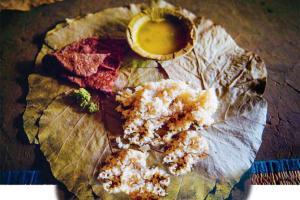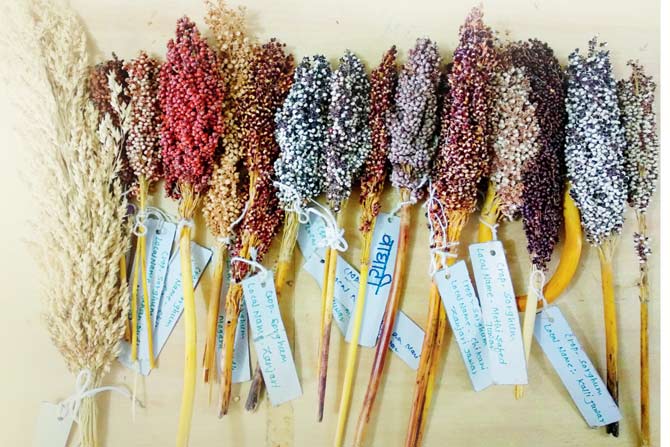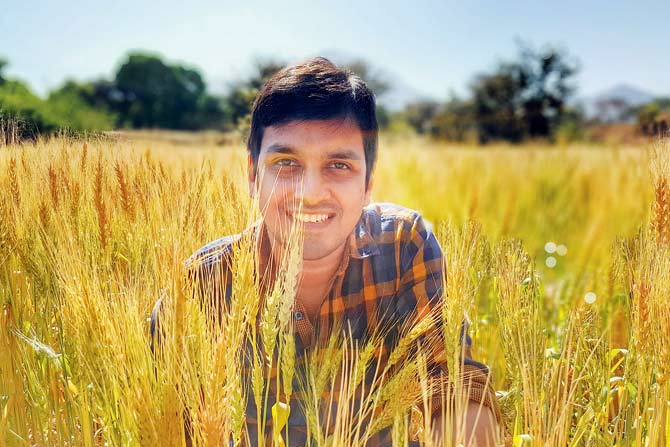Four Mumbaikars left their cushy jobs to support sustainable farming practices in the hills. This Sunday, they bring fresh produce and grains from the region, to a food fest

A traditional meal made with local produce
In urban health food parlance, oats, quinoa and chia seeds occupy a place of honour. From supermarket shelves to diet menus, so widespread are these "superfoods" that the fact that farms within a 100-km radius of the city grow equally — if not more — nutritious veggies and grains might come across as implausible to many Mumbaikars.
ADVERTISEMENT
.jpg)
Paddy farming in Harishchandragad Kalsubai Wildlife Sanctuary
The ramifications of the scales tipping in favour of fancy imports, however, go beyond burning a hole in the consumer's pocket. Tribals who have lived in harmony with nature for centuries — picking fruits and vegetables from forests, and practising sustainable farming — are now chopping down trees to make way for farmlands to grow what urban dwellers consume. As a result, indigenous knowledge about local produce is slowly getting lost.

Sanjay Patil of BAIF is a key driver in the field of seed preservation
"The need to preserve this knowledge and promote produce traditionally grown in the eastern Sahyadris surrounding the Ahmednagar district led to the genesis of OOO Farms," says Shailesh Sakharam Awate, who gave up his IT job last year to pursue his traditional family occupation of farming. He was joined by his friends, Abhay Bhatia, Pranav Khandelwal and Karan Khandelwal. The four were pretty sure that something was amiss in their cushy careers.

Shailesh Awate
"When we began our search for farmland untouched by chemical fertilisers, we realised that it's only the mountains inhabited and cultivated by tribals that remain pristine," says Awate about how the four friends got associated with nearly 50 farmers in the Pachnai, Pethachiwadi and Janewadi villages in the Kalsubai Harishchandragad Wildlife Sanctuary.

Pranav Khandelwal
In their attempt to create a database for the local produce, they were helped by Sanjay Patil of Pune's BAIF Development Research Foundation that works towards providing sustainable livelihood to the rural poor through climate-resilient agriculture. "Mr Patil helped us with the scientific names and nutritional value of these crops.

Attendees can learn about and pick from 12 varieties of jowar
He even helped us procure seeds of many indigenous varieties," explains Awate. They were baffled by over 200 varieties of vegetables and tubers that they had never come across in the city.

Abhay Bhatia
Over 40 such vegetables and an array of grains will be available for sampling and purchase at the Wild Food Festival organised by OOO Farms and BAIF this Sunday. Participants can also tuck into an elaborate lunch comprising millet papad, wild edible vegetables, niger (khurasani) seed chutney, mountain lentil curry, indigenous aromatic rice grown on the Sahyadris, finger millet rotis and rice rotis, tea made from mountainous herbs, ambil (mountain malt), and sweets made from mahua.

Karan Khandelwal
"While taste is a matter of personal choice, what we can guarantee is the high nutritional value of each of these dishes," says Awate. "We need to keep the farmers convinced that their agricultural practices are far better than what's practised in the plains. And for that, we need to create value for what they grow."
On: September 16, 10.30 am to 2 pm
At: Rotary Club, Juhu Tara Road. Santacruz West.
Call: 7208002008
Cost: Rs 850 (includes lunch; entry free for kids below eight years)
Catch up on all the latest Crime, National, International and Hatke news here. Also download the new mid-day Android and iOS apps to get latest updates
 Subscribe today by clicking the link and stay updated with the latest news!" Click here!
Subscribe today by clicking the link and stay updated with the latest news!" Click here!






